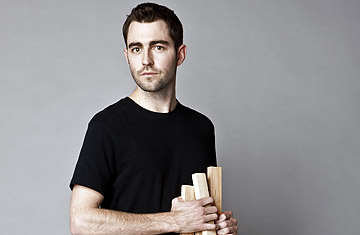
Turned around. Rattray was headed for Wall Street until and epiphany led him to start Change.org
(2 of 3)
The New Tools of Change
Rattray is an uptalker: his sentences all end with a rising inflection, giving the impression that he's not speaking so much as asking a continuous series of rhetorical questions. It's a speech pattern that Hollywood sometimes uses to depict naivet. And it gives Rattray, a 31-year-old Santa Barbara, Calif., native, an air of acute earnestness that might be a disadvantage in your typical corporate setting. But on a recent morning in the high-ceilinged Washington conference room of Change.org Rattray is only one of a dozen young people talking, in varying intonations with uniformly sincere ardor, about the ways their online activism is changing the world. He takes a break from chewing on a chicken sandwich to take in the latest victory: a Pakistani TV station canceled a show after a Change.org petition against its host's moral vigilantism got over 5,000 signatures. Rattray lifts his sandwich aloft like a trophy. "Isn't that just awesome?" he exclaims, for once actually asking a question. The other staffers express their delight by clicking their fingers for a round of snapplause. "If we can make it in Pakistan," he says, "we can make it everywhere."
It probably helps his cause that Rattray does not seem like someone who was born to disrupt. The second of five children of a Raytheon-executive father and real estate broker mom, he grew up removed from the world of social activism. Rattray says he was "that golden boy: homecoming king, student-body president, head of the track team, sports editor of the newspaper and head of the [debate] team." His ambition was to get to Wall Street as quickly as possible and become a Master of the Universe.
His epiphany came during his senior year at Stanford, when one of his younger brothers came out as a homosexual and talked about the trauma he had endured as a closeted gay man. Rattray, who admits to having been "part of the high school culture of making fun of [homosexuals] and using gay as a word of disparagement," felt ashamed. His brother's suffering also made him reassess his own ambitions. "I felt disgusted by the person I wanted to become," he says.
By 2005, Rattray had given up dreams of high finance for public-interest law at NYU. But he threw that over after a friend introduced him to a site called Facebook and Rattray glimpsed a whole new world of bringing about social change via social media. He borrowed $1,000 from friends and family and persuaded a fellow Stanford alum named Mark Dimas to join forces with him. It would be two years before Change.org formally launched and nearly four more before it began to get attention outside a small circle of online activists.
The site really took off last fall, when Molly Katchpole, a 22-year-old college graduate, launched a petition against Bank of America's plan to introduce a $5 monthly fee for debit-card users. The petition attracted over 300,000 signatures in a month and a great deal of media attention: B of A backed down, and several other banks dropped their plans for similar fees. Katchpole then targeted Verizon's $2 fee for certain types of online payments; the telecom company caved after the petition gathered 130,000 signatures in 24 hours.
Other petitions have helped persuade Major League Baseball teams to make anti-homophobia videos and 1-800-Flowers to offer fair-trade blooms, and nudged Universal Studios to incorporate environmental messages on its website for The Lorax. Not all campaigns feature big targets. After 1,600 people signed a petition on the site, a zoning board in Fairfax County, Virginia, backed down from a ruling requiring an Iraq-war veteran to take down a treehouse he built for his sons. It's the small causes that make the site unique, Rattray says. "We don't tell people what issues they should care about. We let them decide and give them tools to do something about it."
